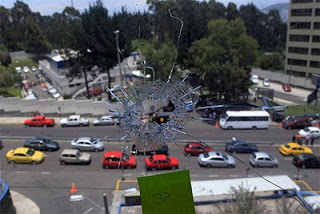
DURING THE ATTEMPTED COUP YESTERDAY IN ECUADOR AGAINST PRESIDENT RAFAEL CORREA, BULLETS HIT THE ROOM HE WAS SEQUESTERED IN DURING THE LATE NIGHT RESCUE OPERATION. INVESTIGATORS CONCLUDED COUP FORCES WERE ATTEMPTING TO ASSASSINATE HIM BEFORE HE COULD BE RESCUED. THE CAR THAT TOOK HIM BACK TO THE PRESIDENTIAL PALACE WAS ALSO HIT WITH SEVERAL BULLETS, INCLUDING ON THE SIDE WHERE HE WAS TRAVELING.
4 comments:
Possible Correa coup involves US meddling?
http://www.youtube.com/watch?v=YXHmMqLDeKU
incredible how that people are without dignity! but at this time, ecuador vive y alba vive!
I followed the coup from europe that night (night in europe), and it was incredible.
there is no peace for latin america.
http://niqnaq.wordpress.com/2010/10/06/strategic-culture-foundation-russia-not-always-100-reliable-but-right-on-here/
Ecuador Coup Attempt Engineered by the CIA
Nil Nikandrov, SCF, Oct 3 2010
Ecuador’s police forces played the key role in the coup attempt which shattered the country on Sep 30. The passing of a law affecting the police officers’ bonuses and job benefits became a pretext for the rebellion which erupted in the capital city of Quito and the Guayquil seaport town. Actually, the law was not supposed to entail pay reductions, but those who masterminded the coup managed to convince the police that it would and thus provoked the uprising. The subsequent developments followed the traditional Latin American pattern: rebels created bases, set up roadblocks, and had all flights to and from Ecuador suspended. The country’s air force counting scores of US-trained officers partially sided with the police, while pilots from Venezuela who served in Ecuador in the framework of the military cooperation program were isolated. President Rafael Correa barely escaped death when he approached the police barracks to explain the reforms personally: shooting was audible around, he was sprayed with tear gas, and, moreover, several combat grenades exploded nearby. The president and his bodyguards took refuge in a military hospital which was promptly besieged by the rebel police forces and armed civilians evidently furnished by the opposition. The siege continued for several hours until special forces arrived and escorted Correa to the presidential palace.
Over the past several years the police of Ecuador was courted by the US Embassy which no doubt had its own interests in mind. Money from funds run by the FBI, the CIA, the DEA, and other US agencies was routinely poured into bonuses for the police top brass and operatives, equipment for various police divisions, etc. The cooperation became so cordial that occasionally the US intelligence community used Ecuador’s police and army intelligence service to keep under surveillance the country’s politicians, journalists, and others regarded as potential opponents of the US. Ecuador’s intelligence services rushed information to their US partners during the crisis that hit the country’s relations with Columbia after the latter bombed FARC camps in the territory of the former, leaving their own government blind to details of the situation. The Jan 2007 advent of Correa’s patriotic administration largely put an end to the abnormal arrangement as the Ecuadorian government started to regain control over the country’s agencies. Among other things, Correa forbade them to maintain unofficial ties with the US Embassy or get on its payroll. The efforts predictably angered Washington which, in one instance, demonstratively demanded that the Ecuadorian drug enforcement agency return the computers formerly supplied to it by DEA. The relations between Ecuador and the US saw another chill when Correa closed the US airbase in Mante. In response, Washington slammed Quito over its friendship with Venezuela and Nicaragua, diapproval of Plan Colombia, and the implementation of an original model of socialism.
etc
FYI
on the attemted coup in Ecuador
http://niqnaq.wordpress.com/2010/10/06/strategic-culture-foundation-russia-not-always-100-reliable-but-right-on-here/
'Ecuador’s police forces played the key role in the coup attempt which shattered the country on Sep 30. The passing of a law affecting the police officers’ bonuses and job benefits became a pretext for the rebellion which erupted in the capital city of Quito and the Guayquil seaport town. Actually, the law was not supposed to entail pay reductions, but those who masterminded the coup managed to convince the police that it would and thus provoked the uprising. The subsequent developments followed the traditional Latin American pattern:'
etc
Post a Comment